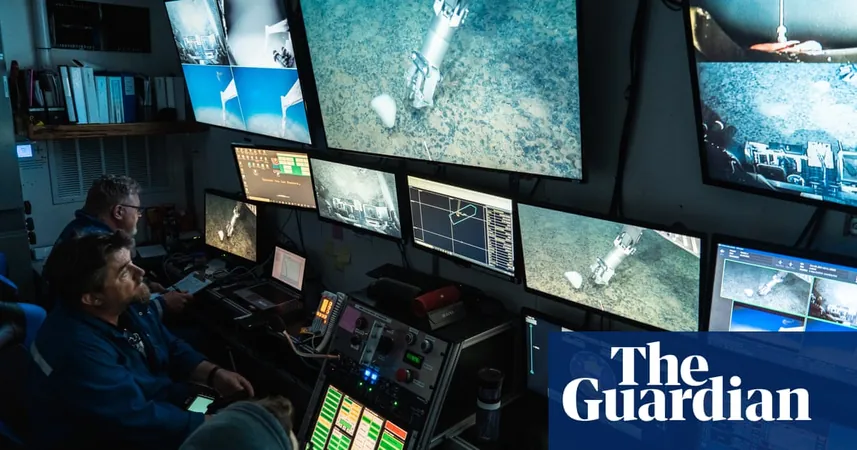
Canadian Firm in Controversial Talks with Trump to Mine Ocean Floors, Sparking Global Outrage
2025-03-28
Author: Emma
Introduction
A Canadian deep-sea mining company, The Metals Company (TMC), has recently disclosed that it is in negotiations with the Trump administration to circumvent a United Nations treaty aimed at regulating seabed mining. This decision could grant the firm authorization to extract valuable resources from international waters, a move that has raised alarm bells among environmentalists and global leaders alike.
Environmental Concerns
Environmental advocates have reacted with swift condemnation, labeling the initiative as "reckless" and a blatant disregard for international cooperative efforts. As calls for a pause on deep-sea mining grow louder, over 30 nations are demanding a moratorium, arguing that the environmental implications of such activities are too severe to ignore. Scientists warn of the irreversible damage industrial mining could inflict on marine biodiversity, threatening fragile ecosystems that have yet to be fully explored.
Response from The Metals Company
Gerard Barron, CEO of TMC, defended the company's position, asserting that they believe they possess adequate knowledge to manage potential environmental impacts. "What we need is a regulator with a strong regulatory framework willing to fairly assess our application,” Barron stated. TMC has formally initiated the process to apply for licenses and permits under the existing US seabed mining code, seeking to act quickly in the absence of established international regulations.
International Reactions
Leticia Carvalho, Secretary General of the International Seabed Authority (ISA), a UN body that oversees deep-sea mining, expressed "deep concern" regarding TMC's plans. During a recent meeting of delegates, she emphasized that any mining activities in international waters must be conducted under the ISA's authority. Unilateral actions, she warned, could undermine the principles of international law and multilateral governance, jeopardizing the collective responsibility for ocean stewardship.
Current Discussions and Regulations
Countries have convened in Jamaica this week to discuss rules for extracting metals such as copper and cobalt from the seabed. However, the ISA council has made it clear that no applications should be processed before regulations are established—a conclusion that could take considerable time.
TMC's Legal Stance
The Metals Company is pushing forward under the 1980 Deep Seabed Hard Mineral Resources Act in the US, rather than adhering to ISA regulations, creating urgency in their exploration efforts. The company has undertaken extensive exploratory operations in the Clarion-Clipperton Zone of the Pacific Ocean, known for its rich deposits of polymetallic nodules as well as a wealth of biodiversity.
Critics and Concerns
With the US's historical refusal to ratify the UN treaty governing deep-sea mining—a treaty that has gained acceptance from 169 member states and the EU—critics argue that TMC's plan reflects a troubling trend towards unchecked exploitation of ocean resources. Greenpeace International campaigner Louisa Casson condemned the move as detrimental to international cooperation, while Duncan Currie from the Deep Sea Conservation Coalition called for an immediate moratorium to prevent potential conflicts arising from such actions.
Voices from the International Community
Georgina María Guillén Grillo, representing Costa Rica at the ISA discussions, echoed these concerns, labeling TMC's initiative as "totally improper." As the world watches closely, the next steps taken by TMC and the international community could significantly impact the future of ocean resource management and conservation efforts. Are we heading towards a new frontier of environmental crisis, or will global pressure and cooperation prevail in safeguarding our oceans? The stakes have never been higher.









 Brasil (PT)
Brasil (PT)
 Canada (EN)
Canada (EN)
 Chile (ES)
Chile (ES)
 Česko (CS)
Česko (CS)
 대한민국 (KO)
대한민국 (KO)
 España (ES)
España (ES)
 France (FR)
France (FR)
 Hong Kong (EN)
Hong Kong (EN)
 Italia (IT)
Italia (IT)
 日本 (JA)
日本 (JA)
 Magyarország (HU)
Magyarország (HU)
 Norge (NO)
Norge (NO)
 Polska (PL)
Polska (PL)
 Schweiz (DE)
Schweiz (DE)
 Singapore (EN)
Singapore (EN)
 Sverige (SV)
Sverige (SV)
 Suomi (FI)
Suomi (FI)
 Türkiye (TR)
Türkiye (TR)
 الإمارات العربية المتحدة (AR)
الإمارات العربية المتحدة (AR)